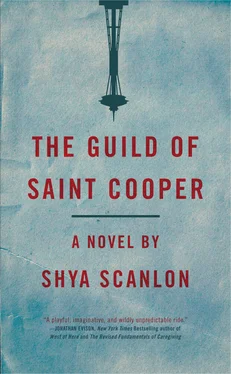“Ew — Blake.”
“How’s New York?”
“Hot and shitty. Listen.”
“Okay.”
“The book has sold out, and they’re printing another run, a big run. Are you sitting down? A hundred thousand, Blake. The whole Seattle thing has turned your book into a best-fucking-seller. The blogosphere can’t get enough.”
I looked down at Blake’s copy of USA Today . The cover showed Kermit the Frog watching Fozzie Bear smoking a joint with the headline “Green With Envy.”
“That’s funny, because Blake was just saying there wasn’t any coverage about it.”
“Blake, are you listening to me?”
“Yes, I’m listening. It hasn’t hit yet.”
“Well, let it hit. Do you want me to shut up?”
“No, keep talking. I need something to go on in the background while I enter a trancelike state.”
Nancy started telling me about an interview the Times wanted to do, but her voice receded as I entered a trancelike state. My heart began beating faster and I watched my mother enter through the front door and walk past me into the dining room, then into the kitchen, then return to stand in front of me with a glass of water. She cocked her head and asked if I was okay. She asked again.
I nodded. “I’m fine.”
“You’re what?” Nancy stopped. “What’s that supposed to mean?”
“It’s Nancy,” I said.
Another shadow flitted across the room — more shingles falling. My mother took a long drink of water.
“It’s my mother,” I said.
“Blake,” Nancy said, “stay with me.”
“I’m with you.”
“You need to get back here.”
“I can’t,” I said. “Not right now.”
“You don’t think Kent can take care of your mother for a little while without you?”
“No. I mean, sure, but that’s not the point.”
“The point is that you’re on the verge of a serious career breakthrough here. Scrap that: the breakthrough has already happened . So now you’re needed. You need to stand by your book.”
Blake emerged from the bathroom wearing her leotard and brought her yoga mat out to the back porch. I knew she’d be happy — she’d be overjoyed — but I also knew I wouldn’t tell her right away. I wanted to hold onto this information, this news. I wouldn’t tell anyone, not for a while.
“Blake?”
“I’m here.”
“That’s the problem. I read something about cell providers pulling out. Is that happening? Are cell phones going to die? I need to be able to get in touch with you.”
“Well, they’ve pledged to keep the data centers running. So it’s just the towers that—”
“Blah blah. Listen: think about it. You could come out for, I don’t know, a few days. I’m also going to try and get you interviews out there. Tell me you would do an interview in town.”
“I’d do an interview in town.”
“Gee, thanks. I’ve gotta go. Pour yourself a drink. Or whatever it is you’re drinking these days. Sparkling water?”
“Nancy.”
“Yes.”
“Thank you.”
“I’m hanging up now. Think interview.”
“I’m thinking. Hey, tell your brother I said hello.”
“Are you kidding? I haven’t seen Mitch for weeks. He’s deep undercover or some shit.”
Click.
I gazed out at Blake, who was in a pose I didn’t recognize. There was a dull thump against the picture window, and I went over to examine the glass, thinking a shingle had hit. In the driveway, nearly camouflaged by a pile of dark debris, was a small brown bird, a sparrow of some sort. It twitched, fluttered its wings, stopped moving.
This would change everything for me. This was what I’d wanted, what I’d hoped would happen. It’s what I secretly wrote for during dark times when I couldn’t write for myself. But instead of feeling good, feeling vindicated, I began to feel anxious. Once they begin to take your book seriously, they begin to take you seriously. I knew how it worked. I’d seen it happen over and over again to writers back in New York. One moment they’d be a struggling writer and the next, after some break or other, poof, they’re an “expert” on something vaguely related to their book, forced to hold forth on topics they have no business in. A book about hippies? Op-eds and essays in the Times about the new antiwar movement. Primary character a chef? Let’s hear you weigh in on Fresh Air about the popularization of molecular gastronomy, or write a column for Rolling Stone about touring the drive-thrus of Iceland. Now I would be an expert. An expert on decline, collapse. On the future! The more I thought about it, the more anxious I became. Being forced to opine about the general social, political, or cultural goings-on made me want to puke. I knew nothing. I had nothing to offer; I was psychologically insulated from reality, and the only thing I could even remotely claim to know was myself. It was staggering to me that people had time for anything else, that they could read the right books and watch the right documentaries and be in the right place at the right time and that they could actually discuss these things with authority and aplomb. People whose primary vocation was making things up! People who specialized in the particularization of universals, asked to generalize on particulars! This was a nightmare. Was there a way around it? Was there nothing I could do? Could I just do nothing?
“Thanks for all your work out there,” said Kent.
Startled, I turned around to see my brother standing in the doorway. He was drenched in sweat, filthy, and his right hand was bleeding.
“Sorry,” I said. “I was on the phone with Nancy.”
“Did she have any roofing tips?”
“Just checking in.”
“Am I going to get any more help from you today?”
“Absolutely. I’ll get you a Band-Aid.”
I WOKE UP WITH the alarm, having been inspired by my conversation with Nancy to set one. I wanted to get up, to write in the morning like I used to, like I was out of the habit of doing. Especially if I’d be resisting interviews, I reasoned, I needed a great follow-up to Forecast . Something for the fans. Similar but different. A book that didn’t seem to turn away from my “voice” but that felt like an evolution, a maturation. Fortunately, I’d begun just such a book before the evacuation, and though I’d put it down since returning to Seattle, I had the sense that it wouldn’t be too difficult to pick up where I’d left off. The radio was set to a classic rock station but it was just the DJ talking. She kept saying she was going to take me through the hour, then playing a clip of car horns. Blake waved one arm around in the air as if struggling to close a curtain. It dropped back into bed once I pulled the plug.
“Sleep in for both of us,” I said.
In the kitchen, Crystal was pouring herself a glass of water and Olivia sat at the counter eating apple slices with crumbled blue cheese.
“Your cheese is moldy,” I said, rubbing my eyes.
“It’s supposed to be moldy,” she said.
“They just say that so you’ll eat it.”
“Mom!”
“He’s just joking with you,” said Crystal. “That’s the way Uncle Blake connects with people.”
“Your mother is right,” I said. “Let this be a lesson to you, Olivia: never joke about cheese.”
Crystal rinsed her glass and set it to dry. “Are you almost ready, sweetie?”
Olivia nodded, stuck an entire apple wedge into her mouth, and slipped down from the stool. She held her hand over her mouth, then, after seeing her mother wasn’t looking, opened it to show me.
“Mmm,” I said. “I love moldy see-food.”
Olivia giggled.
Читать дальше












